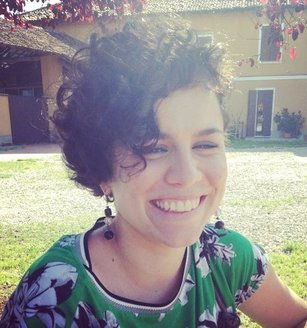
Marta Calbi @martacalbi
I’m Marta Calbi, Ph.D. student at Parma University – Neuroscience department (Italy). I studied Psychology and Neuropsychology at the University of Milano-Bicocca and got my MA under the supervision of EEG-specialist Professor Alice Mado Proverbio, thesis-title: “Neural mechanisms of body language comprehension: an ERP study.” I’m attending my second Ph.D. year in Parma and my tutor is Professor Vittorio Gallese. My project is about neural mechanism subserving the ability to understand people’ emotional and mental states.
I’m mainly interested in the role of Emotional Body Language, that is, how affective information conveyed by bodies (posture, gesture etc.) is processed, and how it interacts with other information’s source, such as faces or social context. Due to my education I mainly use EEG as a measure, but recently also started using eye movement recording techniques to investigate visual exploration patterns of emotional facial expressions and emotional body postures.
My stay at the was enabled with the help of Katrin Heimann by fundings from a different project investigating motor resonance mechanisms during the observation of graphic symbols; EEG was recorded in Parma already, so my task in Aarhus was mainly data pre-processing and time-frequency analyses of the dataset.
I was really impressed by the strong collaborative atmosphere at the IMC, and by the frequent workshops and lectures about different research’ themes presented by experts of different fields (cognition, communication, language…) not only from Aarhus University, but from all over the world. On many occasions they were opportunities of exchange.
As the name of the centre suggests, I perceived that interaction with each other and interdisciplinarity are ones of the principle encouraged by the Andreas Roepstorff, the chief of the centre, and his co-workers.
I spent two months at the IMC. Far from working only at my data, in this time I had endless opportunities to get involved with different people, professors, researchers and students, who all helped me to better define my research’ interests and frame my project and even my further career. All together as well as individually, these occasions gave me the push to examine in depth were I want to go and what I need for that – a collaborative supervision unknown to me till this point. I also had the possibility not only to teach the basics of EEG pre-processing to three students, who then helped me with the EEG analyses, but also to give a guest lecture about my field of research to a class. I think I all these experiences will help me immensely in my future, to work alone as well as to collaborate and to discuss my research topics with others.
Worth a separate note is that, with regard to Neuroscience, I particularly profited from the cooperation of the IMC with the Centre of Functionally Integrative Neuroscience - CFIN/MIND Lab, and especially the EEG/MEG group there. Due to Katrin Heimann’s initiative, I took part in the lab-meetings of this group (lead by Yury Shtyrov), which also gave me the possibility to give a talk about my current project and ask them for advice and opinions on how to better analyse the data. Most notably, some members of the group, especially Andreas Hojlund and Kousik Sarathi Sridharan, also outside this event spent much more hours than I could have ever expected to counsel me and to help me implement their suggestions in my programming routines and scripts and even pushed me to always ask them for advice if there would still be problems.
I also to took part in a Fieldtrip workshop organized at the IMC by Katrin Heimann and given by two developers from the Donders Institute for Brain, Cognition and Behaviour Nijmegen, the Netherlands. The workshop focused on advanced analysis methods of MEG, EEG, and invasive electrophysiological data (time-frequency analysis, source reconstruction using dipoles, distributed sources and beamformers and non-parametric statistical testing) and I profited a lot from it.
Furthermore I attended a full-day interactive workshop about the Default Mode Network, that taught me an extremely fruitful discussion culture that I find uncomparable to all I know from my usual surroundings.
Don’t hesitate to ask help and to take part to lectures and meetings. Live the IMC at the fullest. Talk with people, don’t stay in front of your pc all the time, discuss about your research topic.